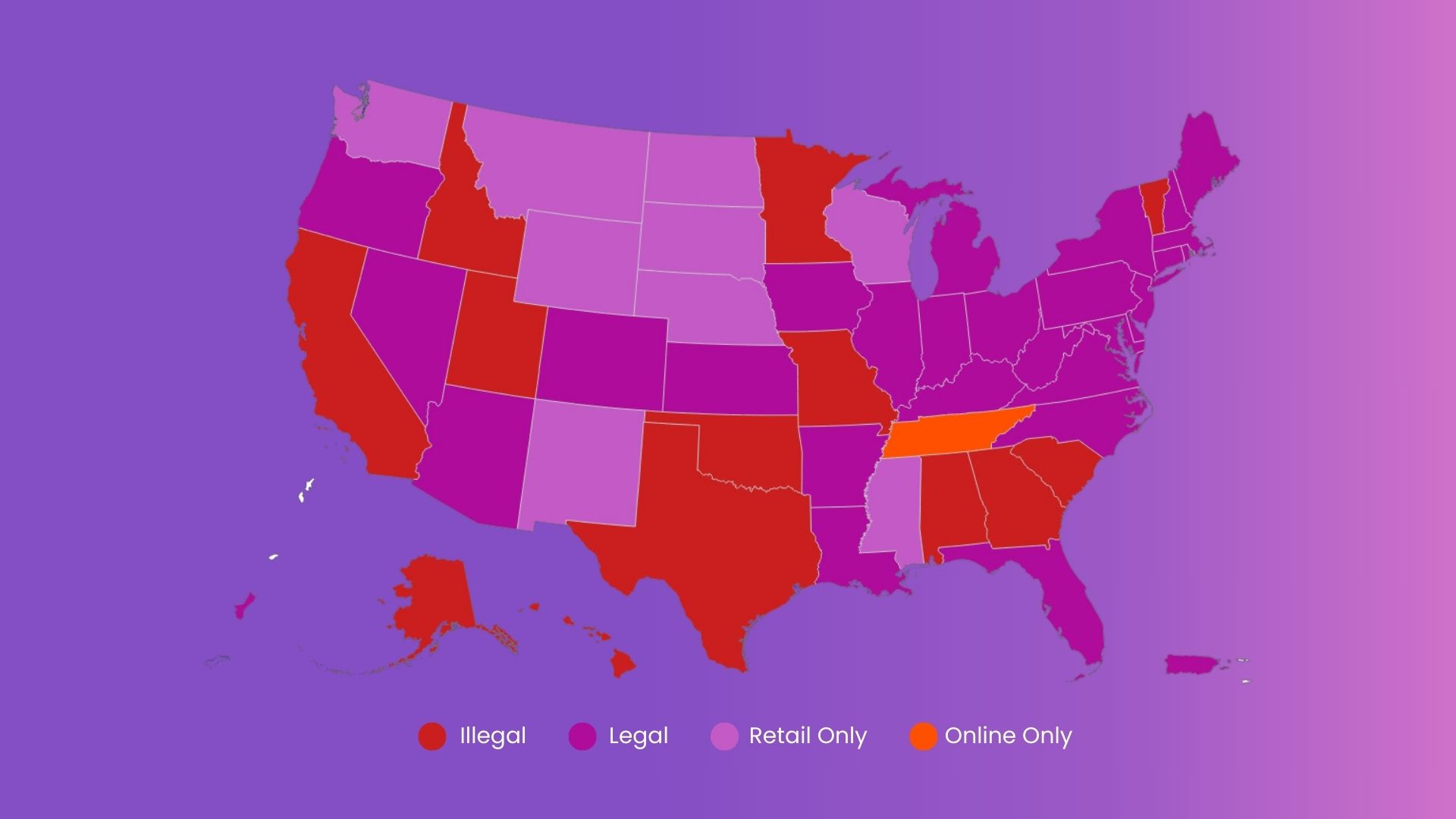Where Is Sports Betting Legal in 2025: A Guide to Legal Betting in the U.S.

States Where Sports Betting Is Legal (As of October 2024)
- Arizona – Sports betting is live and legal in Arizona.
- Arkansas – Sports betting is live and legal in Arkansas.
- Colorado – Sports betting is live and legal in Colorado.
- Connecticut – Sports betting is live and legal in Connecticut.
- Delaware – Sports betting is live and legal in Delaware.
- District of Columbia – Sports betting is live and legal in Washington, D.C.
- Florida – Sports betting is in active legislation in Florida.
- Illinois – Sports betting is live and legal in Illinois.
- Indiana – Sports betting is live and legal in Indiana.
- Iowa – Sports betting is live and legal in Iowa.
- Kansas – Sports betting is live and legal in Kansas.
- Kentucky – Sports betting is live and legal in Kentucky.
- Louisiana – Sports betting is live and legal in Louisiana.
- Maine – Sports betting is legal but not yet operational in Maine.
- Maryland – Sports betting is live and legal in Maryland.
- Massachusetts – Sports betting is legal but not yet operational in Massachusetts.
- Michigan – Sports betting is live and legal in Michigan.
- Mississippi – Sports betting is live and legal in Mississippi.
- Montana – Sports betting is live and legal in Montana.
- Nebraska – Sports betting is legal but not yet operational in Nebraska.
- Nevada – Sports betting is live and legal in Nevada.
- New Hampshire – Sports betting is live and legal in New Hampshire.
- New Jersey – Sports betting is live and legal in New Jersey.
- New Mexico – Tribal sports betting is legal in New Mexico.
- New York – Sports betting is live and legal in New York.
- North Carolina – Sports betting is live and legal in North Carolina.
- North Dakota – Tribal sports betting is legal in North Dakota.
- Ohio – Sports betting is live and legal in Ohio.
- Oregon – Sports betting is live and legal in Oregon.
- Pennsylvania – Sports betting is live and legal in Pennsylvania.
- South Dakota – Sports betting is live and legal in South Dakota.
- Tennessee – Online-only sports betting is live and legal in Tennessee.
- Virginia – Sports betting is live and legal in Virginia.
- Washington – Tribal sports betting is live and legal in Washington.
- West Virginia – Sports betting is live and legal in West Virginia.
- Wisconsin – Tribal sports betting is legal in Wisconsin.
- Wyoming – Online-only sports betting is live and legal in Wyoming.
States Where Sports Betting is Not Yet Legal
- Alabama – Sports betting is not legal in Alabama.
- Alaska – Sports betting is not legal in Alaska.
- California – Sports betting is not legal in California.
- Georgia – Sports betting is not legal in Georgia.
- Hawaii – Sports betting is not legal in Hawaii.
- Idaho – Sports betting is not legal in Idaho.
- Minnesota – Sports betting is not legal in Minnesota.
- Missouri – Sports betting is not legal in Missouri.
- Oklahoma – Sports betting is not legal in Oklahoma.
- South Carolina – Sports betting is not legal in South Carolina.
- Texas – Sports betting is not legal in Texas.
- Utah – Sports betting is not legal in Utah.
Overview of Sports Betting Legalization in the U.S.
The United States has taken giant steps in legalizing sports betting.
Historically, it was an illegal activity as stipulated in federal regulations. The 1992 Professional and Amateur Sports Protection Act (PASPA) ensured that. This act restricted the country from launching legal sports betting businesses.
Essentially, PASPA stopped state governments from taxing sports gambling. Think about the millions of dollars in revenue if sports betting were legal back then.
But finally, the sports betting landscape took a pivotal turn in 2018. The Supreme Court ruled that PASPA was unconstitutional, opening doors for legal sports betting. Gone were the days when bettors relied on black markets and offshore platforms.
That 2018 Supreme Court ruling set forth a domino effect across the country. Initially, most states are only allowed to bet on horse racing. That changed right away.
Take a look:
- States started to develop their regulatory frameworks. Legal online sportsbooks have become a norm in the digital age.
- The first retail sports betting launched after the 2018 ruling.
- Convenience became a growth driver. Mobile sports betting allows people to place bets anytime and anywhere.
- Sports betting has had a positive impact on the economy. In 2023, Americans spent $120 billion on sports betting. That includes legal online sports betting and traditional gambling.
Of course, regulated sports betting still navigates many challenges. Bettors and bookmakers still need to understand online gambling laws in the US. We’ll discuss these legal challenges in more detail in the following sections.

Sports betting bill to protect gambling-related risks
The New York Senate recently passed a bill to safeguard bettors from addictive risks. This requires sports betting advertisements to inform people about gambling’s harmful effects.
New York Senator Leroy Comrie initiated this bill. It also requires advertisements to show New York’s gambling hotline number. This bill is a great example of promoting responsible gambling.
Ohio, Pennsylvania aims for new betting restrictions
In Pennsylvania, a Senate bill will prohibit using credit cards to fund online gambling activities. That includes online sports betting, casino, and lottery. Pennsylvania State Senator Wayne Fontana filed this bill.
Meanwhile, Ohio becomes the 25th state to limit prop bets on college sports. This initiative protects in-state collegiate teams from harassment. In fact, the National College Athletic Association (NCAA) asked states to ban college prop bets.
Nonetheless you can still bet on main events like the Super Bowl LIX.
Federal Regulations Impacting Sports Betting
Before the 2018 Supreme Court ruling, federal laws ruled on sports betting. Only a few states were allowed to regulate sports betting.
Take a look at the federal regulations that historically influenced sports betting:
- Professional and Amateur Sports Protection Act (PASPA): This stopped states from legalizing betting. It did allow some exceptions, though. Nevada was allowed to offer all kinds of sports bets. Meanwhile, Delaware, Oregon, and Montana had partial exemptions.
- Interstate Wire Act of 1961: The Federal Wire Act prohibited interstate wager transmissions. This federal initiative might still affect state-wide mobile sportsbooks.
- Unlawful Internet Gambling Enforcement Act (UIGEA): UIGEA prohibited payments for online gambling. This was way back in 2006, though. Today, sports betting states find ways to ensure legal financial transactions.
- Sports Bribery Act of 1964: This act criminalized sports outcomes briberies. The Sports Bribery Act is still influential in fighting sports corruption.
These federal laws aren’t as influential today as it was back then. All it takes is a state legislature to allow sports betting.
These federal laws aren’t as influential today as they were back then. All it takes is a state legislature to allow sports betting.
Online Sports Betting: Legal Status and Availability
There’s no stopping the growth of online sports betting.
The overturning of PASPA boosted the market of online sportsbooks. A total of 31 states have legal online sportsbooks today. However, they differ in regulations and online sportsbooks.
Here are state-by-state variations in offering legal online sportsbooks:
- Arizona: Retail and online sports betting have been legal since 2021. Arizona has partnerships with tribal casinos.
- Colorado: Retail and online sports betting have been legal since 2019.
- Connecticut: Allows online sports betting since 2021. Connecticut has partnerships with state lotteries.
- Delaware: Online sports betting has been legal since 2009. However, Delaware only offers limited options through the state lottery.
- District of Columbia: Limited online betting and retail sports gambling since 2020.
- Florida: Resumed online sports betting in 2023. However, Hard Rock Bet is the state’s sole sports betting site.
- Illinois: Provides online sports betting since 2020. Illinois offers eight online options, including Caesars Sportsbook and ESPN BET.
- Indiana: Legal online and in-person sports betting since 2019. Indiana offers twelve online options, including the DraftKings sportsbook app.
- Iowa: Fully online sports betting since 2021.
- Kansas: Offers both online and land-based wagering since 2022.
- Kentucky: Offers online and retail wagering. Kentucky allowed eight mobile operators, including FanDuel Kentucky.
- Louisiana: Legal online and retail betting since 2021.
- Maine: Allowed online betting in 2023. Maine only offers two online sportsbooks, including Caesars and DraftKings.
- Maryland: Legalized online sports betting in 2022. Maryland offers nine sportsbooks, including Fanatics Sportsbook.
- Massachusetts: Massachusetts online sports betting was launched in 2023.
- Michigan: Offers a total of 13 sportsbooks on mobile and online platforms.
- Mississippi: Online sports betting is legal at physical casinos.
- Nevada: Online sports betting has been legal since 2010. Nevada was exempted from the PAPSA rule.
- New Hampshire: Online sports betting has been legal since 2019.
- New Jersey: Offers online sports betting via a total of 16 sportsbooks.
- New York: Legal online sports betting since 2022.
- North Carolina: Became the latest state to allow online sports betting in 2024.
- Ohio: Online sports betting was legalized in 2023.
- Oregon: Online sports betting was legalized in 2019.
- Pennsylvania: Online sports betting was introduced in 2019.
- Rhode Island: Only offers online sports betting through Sportsbook Rhode Island.
- South Dakota: Online betting is only allowed within Deadwood casinos.
- Tennessee: Only offers mobile and online sports betting. Tennessee doesn’t have land-based casinos.
- Vermont: Vermont online sports betting was launched in January 2024.
- Virginia: Legal mobile and online sports betting since 2021.
- West Virginia: West Virginia has allowed legal online sportsbooks since 2019.
- Wyoming: Online sports betting was introduced in 2021.
Each state differs in key regulations, including online and retail availability.
There are states that legalize sports betting in retail locations only. There are the likes of New Mexico that only offer sports betting through tribal casinos. Then, there’s South Carolina, which bans all sports betting forms.

Another example is Las Vegas, which has allowed sports betting for decades. Every state has different regulations, including the following:
- Licensing: Online and in-person sportsbooks differ in licensing requirements. Specific business permits could vary, too.
- Registration: Land-based platforms may require physical registration.
- Geofencing: Some states enforce strict geolocation requirements. This is to ensure that wagers are placed within state lines.
- Payment processing: States also implement different payment processing regulations. They have to work around the Wire Act and UIGEA regulations.
Understanding these variations is also crucial when starting a sportsbook business. Are you launching in retail-only locations like North Dakota? Or are you entering a more open state like West Virginia?
Bookmakers should understand these laws to avoid compliance pitfalls.
Navigating Legal Challenges in Sports Betting
Without legal challenges, online sports betting could become chaotic.
Regulations are needed to stabilize legal online sportsbooks. They have to navigate through legal challenges such as:
- Compliance: Licensing authorities require the submission of documents and permits. These requirements change over time, though. Legal online sportsbooks must keep up with evolving regulations.
- Security: Protecting financial and user data is a priority. Legal online sportsbooks should avoid data breaches and hacks.
- Integrity issues: Reputation is essential for a sports betting app. Avoid insider trading, match-fixing, and fraudulent activities.
- Taxation: Each state has its own taxation structure. It’s a complex regulation that legal sportsbooks should adhere to.
We haven’t even talked about marketing challenges yet. The industry is already brimming with sports betting sites. How can you differentiate in the online sports betting industry?
Most legal online sportsbooks partner with marketing experts. This way, they’re hitting two birds with one stone. They can promote their brand while developing their product.
Just imagine how a sports betting marketing agency like Fortis Media can help you. Their experience helps them recognize patterns in the online sports betting market. They can drive sustainable success amidst the evolving regulations.
Managing a legal online sportsbook is a tough task. Knowing how to allocate your resources can streamline your operations.
Future Trends in Sports Betting Legislation
In 2023, the US sports betting market posted a record $11 billion in revenue. Just imagine its continuous growth with the advent of mobile apps and commercial casinos.
Moreover, holdout states will soon join the party. Expect the likes of South Carolina and New Mexico to consider legalization. Furthermore, brick-and-mortar casinos are now offering mobile sports betting.
In addition, emerging technologies could boost online sports betting even more. Take a look:
- Cryptocurrencies: Legal online sportsbooks have invested in different payment methods. One of these is cryptocurrencies and blockchain. These offer quicker transactions and increased privacy.
- AI and ML: Artificial Intelligence (AI) and Machine Learning (ML) provide multiple benefits. These are integral in predictive analytics and personalized betting.
- Mobile platforms: Mobile platforms drive accessibility unlike any other. However, it should come with geolocation technologies and consumer protection.
- Regulatory technology: RegTech helps legal online sportsbooks streamline compliance requirements. This technology allows for easier tax collection and regulation.
Moreover, sports betting variations are steadily emerging. We’re seeing the growing popularity of eSports betting and Daily Fantasy Sports (DFS).
All of these trends point towards sustainable success for online sports betting.
Key Takeaways
Since 2018, the US sports betting scene has rapidly expanded.
Legal online sportsbooks have thrived since the uplifting of the federal ban. Each state now has multiple locations of in-person betting platforms. Even professional sports leagues have partnerships with sportsbooks.
Still, there are regulations to navigate through. Legal online sportsbooks can’t only plan for growth. They have to comply with data security, anti-fraud, and responsible gambling practices.
So, keeping up with a new law is a must for bookmakers and bettors. A state law can dictate how platforms can offer sports betting. Adhere to these regulations to continue betting online.
FAQs
Can tourists participate in sports betting while visiting a legal state?
In most cases, tourists can place wagers while visiting a legal state in the United States. However, tourists must also comply with legal retail or online sports betting regulations. This includes geolocation verification, legal age compliance, tax implications, and adherence to gambling problem measures.
How do state taxes affect winnings from sports betting?
Sports betting winnings are considered taxable income, whether that’s from the perspective of the states or the Internal Revenue Service (IRS). This means that you can’t collect all of your sports betting winnings. Tax rates could vary depending on residency, state laws, and federal taxes.
What are the requirements for sports betting licenses in different states?
Some of the common licensing requirements for sportsbooks include financial documents, cybersecurity measures, business structure, and gambling problem measures. Getting a sports betting license varies in each state, especially in terms of licensing fees, company reviews, and legal or regulatory compliance.
How does the federal government regulate sports betting across state lines?
Since the overturning of the 1992 PASPA rule, there’s been no federal ban on sports betting across different states. This means that each state has the jurisdiction and authority to impose its own regulations, whether for legal online sportsbooks or retail locations.
Read our other articles

iGaming SEO: The Ultimate Guide to Ranking iGaming Sites in 2025


How SEO and PPC Work Together: A Practical Guide


What is a PPC Agency? A Comprehensive 2025 Guide






